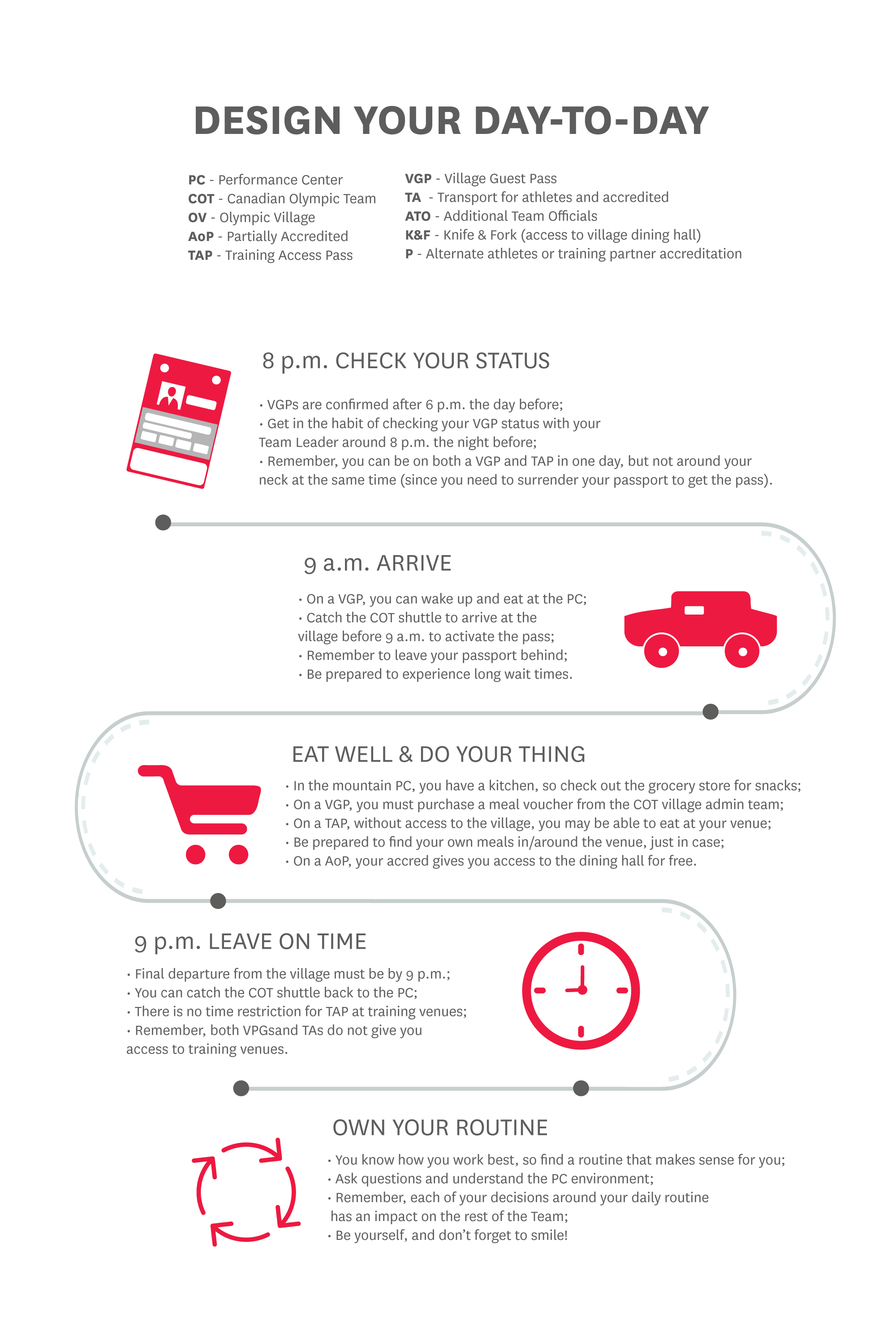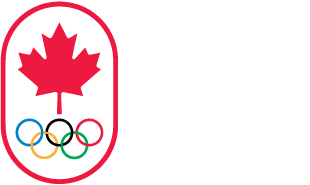LIVE LIFE AT GAMES LIKE THE EXPERT YOU ARE
HOW TO GET WHAT YOU NEED FROM YOUR OLYMPIC ENVIRONMENT:
Do you hang out in the kitchen of a restaurant while the chef makes your meal? Do you watch the mechanic fix your car, or help the dentist clean your teeth?
Probably not. These are experts who need a very specific environment to perform.
The Olympics are no different. But at Games, it’s you who becomes the chef, the mechanic, the dentist: you are the expert at what you do, each in your different roles, and you need a very specific environment in which to do it. This is why — as a single, multi-sport team — we do everything we can to create that environment for you, so you can live your life at the Games like the expert you are and contribute to Team Canada’s overall performance in the most optimal way.
BE PRESENT
Sure, it’s a challenge to just ‘be yourself’ and ‘be present’ when access at Games is so tightly restricted. There are many things that will affect you which you can’t control. We get it. Different levels of access create different circumstances for everyone, and where you happen to live during the Games is a big factor.
More importantly, though, where you live and work at Games is also a huge logistical part of contributing to your team’s performance … which is why we are all here in the first place, right?
So, to help you deliver on your expertise, and create the best environment for your team, we’ve outlined some key information and planning practices for Games.

THE BUBBLE REALITY
At the Olympics, some people live inside the Olympic bubble and others live outside. It’s important that you understand the difference between the two.
Living inside the bubble is not a privilege or an expectation. It’s a reality. Like a chef in a kitchen, it’s where a particular expert needs to be at any particular moment to help Canada’s overall performance.
For those living outside the bubble, it’s the same approach: You are still your own chef, in your own kitchen, but your tools will look a little different.
Each of us is making key contributions to the larger success of our team. And for many, this means managing the specific circumstances and different access levels that come with living outside the bubble.
With that in mind, here’s a reminder of how the process will have an impact:
How will accreditation affect your planning?
Indeed, it can be tricky.
You may have been to PyeongChang already. Maybe not. Regardless, when you arrive for the Games, it may not be what you expected.
It’s not easy to see the big picture when trying to plan for an Olympic experience inside restrictions that don’t align with your expectations. And trust us when we say it’s tricky for all of us.
BUT, WHY?
Why is it a challenge? Because Team Canada has a very large Team Delegation which reflects the size and potential of our winter group. To belong, in any capacity, is amazing. But it also means we must prioritize available resources and individual work-flows. Here’s a quick glance of what it looks like:
• Team Canada has more members than the IOC can provide beds, accreditations or access passes;
• Since 2008, we have implemented the “Performance Centre” (PC) to create a Team-home outside of the Olympic Village, exclusive to Team Canada, but with similar services;
• For PyeongChang 2018, we have around 80 beds at PC-coast and 60 at PC-mountains;
• PC residents will have various access levels to Olympic sites, and not all passes are treated equally;
• The PC atmosphere is chill and easy to connect with teammates from various sports;
• Team Canada provides shuttle service daily to and from the Olympic Villages.
WHAT DOES THIS MEAN FOR ME?
Well, first and foremost, it means developing the best attitude possible for you to have a positive impact on the Team and a terrific Games experience. Over the years, we’ve learned how you choose to react to your living situation is a big part of this.
We know living outside of the bubble means restricted access to the team, yet you still have a job to do working with them. So, what do you do? You need to adapt to your environment.
At a human level, this can be tough. As a professional, this can be tough. You want to deliver and perform to you and your team’s expectations.
Your coping mechanisms may be challenged when you first arrive at the Games, but in that moment, it is important to refocus, and make sure you have the proper perspective on the big picture and your contribution to the overall success of the team.
For example:
Action: I will find what I need to perform.
Anticipation: I have a plan for this.
Communication: My team knows what’s up, always.
Or, if you let it, your reaction to your living situation at Games can cause unnecessary problems:
Frustration: This is an unfair disadvantage.
Confusion: This not how I thought it would be.
Distraction: I’ve got other things to worry about.
So, in an effort to manage predictable challenges before they occur, we are here to help you plan for them and understand how your Games experience will be affected.
SOLID SOLUTIONS
Get informed: Information is aplenty, especially during the last few weeks of any Games lead-up. But, we realize not everyone works or plans in the same way. So, be sure to leverage the resources available to you and gain as much logistical info as early as possible to share and visualize how your Games experience should be.
Set your expectations: Each member of Team Canada is equally valued and respected in their expert roles. However, all things are not created equal at Games. So, as a one multi-sport group, we work hard to uphold a winning environment for everyone. To accomplish this, we must remember to set our expectations accordingly so athletes and performance can remain our collective top priority.
Have a plan of action: If we are going to remain 100% accountable and make logical, team-focused decisions on the ground, it’s key to plan for predictable distractions. Here are some basic things to consider:
- Transportation: Which mode of travel will you be using daily? What are your usual routes?
- Accommodation: Do you know where you are living and how it will affect your plan?
- Access: Do you have the right pass to get where you need to be at any time?
- Food: Where and how will you be getting the food you need?
- Clothing: Have you confirmed your clothing package, sizes, etc.?
- Games arrival: Do you know the process?
- Communication: What team meetings are you able to attend and how are you communicating when you are not able to attend?
- Role: How are you having to adapt to be the expert that you know you are?
- Presence: How will your presence with the team be the same or different?
It’s true things never seem to go entirely as planned. However, we know that teams succeed more often by following detailed and carefully rehearsed plans, making them more resilient in the face of what the Olympics will throw at them.
To help you design your own specific routine, here’s an outline of what a typical day at Games could look like for a PC resident traveling daily to the Olympic Village.

To perform like experts, we must first know our environments, whatever they may be.
STAY TUNED: The COC will be sending a logistics email to all PC residents in mid-January.


Got something to say?